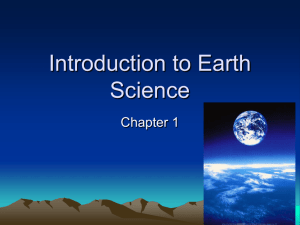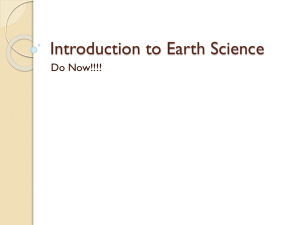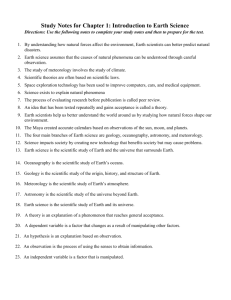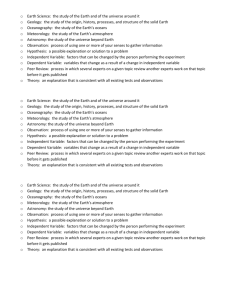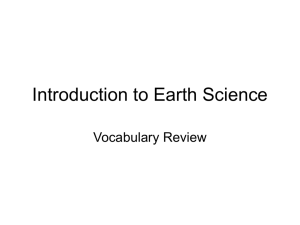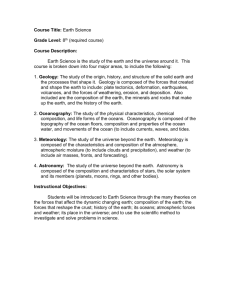Unit One: Earth Science
advertisement
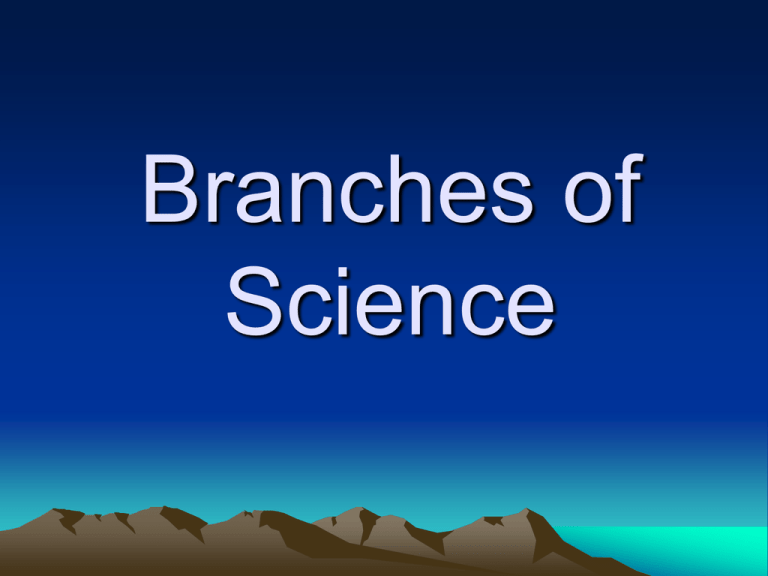
Branches of Science What is Science? Science is the methods we use to investigate the world and solve problems. We use the process of science everyday. When a toddler can’t tie his/her shoe. The problem is how can he/she tie his/her shoe? He/She investigates by trying different ways of tying the shoe. Then eventually the toddler solves their problem by learning to tie the shoe. By definition the toddler has just used the process of science. Three Branches of Science • Life Science • Earth Science • Physical Science Life Science • The study of living things is known as biology, or life science. People who study biology are known as biologist. Careers in Life Science • Botanist • Marine Biologist • Park Rangers • Forestry Technician • Health-Care Workers Earth Science The Study of the Earth Earth Science is the study of the earth and the universe around it. – It is the oldest observable science and is based on the accumulated body of scientific knowledge that has been passed through time The Major Studies of Earth Science Geology Oceanography Meteorology Astronomy Introduction to Earth Science • Geology- the study of the origin, history, and processes that created the structure of the earth • Oceanography- the study of the earth’s ocean • Meteorology- the study of the earth’s atmosphere • Astronomy- the study of the universe The Scope of Earth Science 1. Astronomy – Astronomy is the study of objects beyond Earth’s atmosphere. – Astronomers study the universe and everything in it, including Earth’s place in space, its neighbors, and other bodies in the universe. The Scope of Earth Science 2.Meteorology – Meteorology is the branch of Earth science that studies the air that surrounds our planet. – Meteorologists study the forces and processes that cause the atmosphere to change to produce weather. – They also try to predict the weather and how changes in weather might affect Earth’s climate. The Scope of Earth Science 3.Geology – Geology is the study of the materials that make up Earth and the processes that form and change these materials. – Geologists identify rocks, study glacial movements, interpret clues to Earth’s 4.6 billion-year history, and determine how forces change our planet, among many other things. The Scope of Earth Science 4.Oceanography – Oceanography is the study of Earth’s oceans, which cover nearly three-fourths of the planet. – Oceanographers study the creatures that inhabit salty water, measure different physical and chemical properties of the oceans, and observe various processes in these bodies of water. Section Assessment 1. Match the following terms with their definitions. C geology ___ D oceanography ___ B meteorology ___ ___ A astronomy A. the study of objects beyond Earth’s atmosphere B. the study of the air that surrounds Earth C. the study of the materials that make up Earth and the processes that form and change these materials D. the study of Earth’s oceans Physical Science Physical Science is the study of matter and how matter changes. There are Two Main Areas of Physical Science Chemistry & Physics Chemistry vs. Physics • Chemistry is the study • Physics is the study of the properties of of matter and energy matter and how and how they interact. matter changes. • Physics is concerned • Chemistry studies with the interaction composition, between matter and structure, properties, energy through force and reactions of and motion. matter. Section Assessment 1. Match the following terms with their definitions. C chemistry ___ D physics ___ B chemistry ___ ___ A physics A. the study of the interaction between matter and energy through force and motion B. the study of the properties of matter and how matter changes C. the study of the composition, structure, property and reactions of matter D. the study of matter and energy and how they interact
